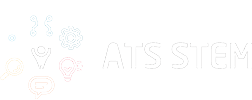09 Dec Updates on the ATS STEM pilot implementation in Cyprus
After a month of preparation and despite covid-related issues arisen, we are pleased to announce that the ATS STEM pilot implementation in Cyprus has started with schools applying their first STEM learning cycle in their classrooms.
At this stage, all 11 schools participating in ATS STEM are designing their STEM learning cycles to be implemented in 18 public classrooms. The first classroom implementations started in early December 2020 and all learning designs are up for development by mid-December 2020.
ATS STEM
Statements and opinions
We have used the digital tools sli.do and ahaslides to facilitate discussion and enhance students’ critical thinking skills within the classroom.
S., teacher, Limassol
The design and the implementation of our first learning cycle have been highly satisfying experiences so far. Every day I see my students becoming more and more interested and involved in the process as the cycle proceeds. Even the children who were the most difficult to motivate and actively include in activities are taking part in this project with enthusiasm and positivity. Day by day, I witness the change in the mentality of my students, as they now feel equal partners in the classroom. I am really excited to see where our STEM adventure will take us!
P., teacher -Nicosia
The teachers have come up with a great variety of project topics and most of them are working hard to make the process as effective as possible for the students using digital tools for formative assessment.
D., mentor
I used sli.do for the analysis and synthesis of my ideas. I felt like the use of digital tools has helped me increase my participation in classroom discussions.
Student (10y), Limassol
By the end of the first ATS STEM learning cycle, 346 students are going to engage in interdisciplinary learning to solve real-world problems brought into their classrooms by 31 teachers developing integrated STEM curricula to equip the students with the STEM skills and competencies needed to face 21st-century challenges.
The first learning cycle is expected to be completed by the end of January 2021.




